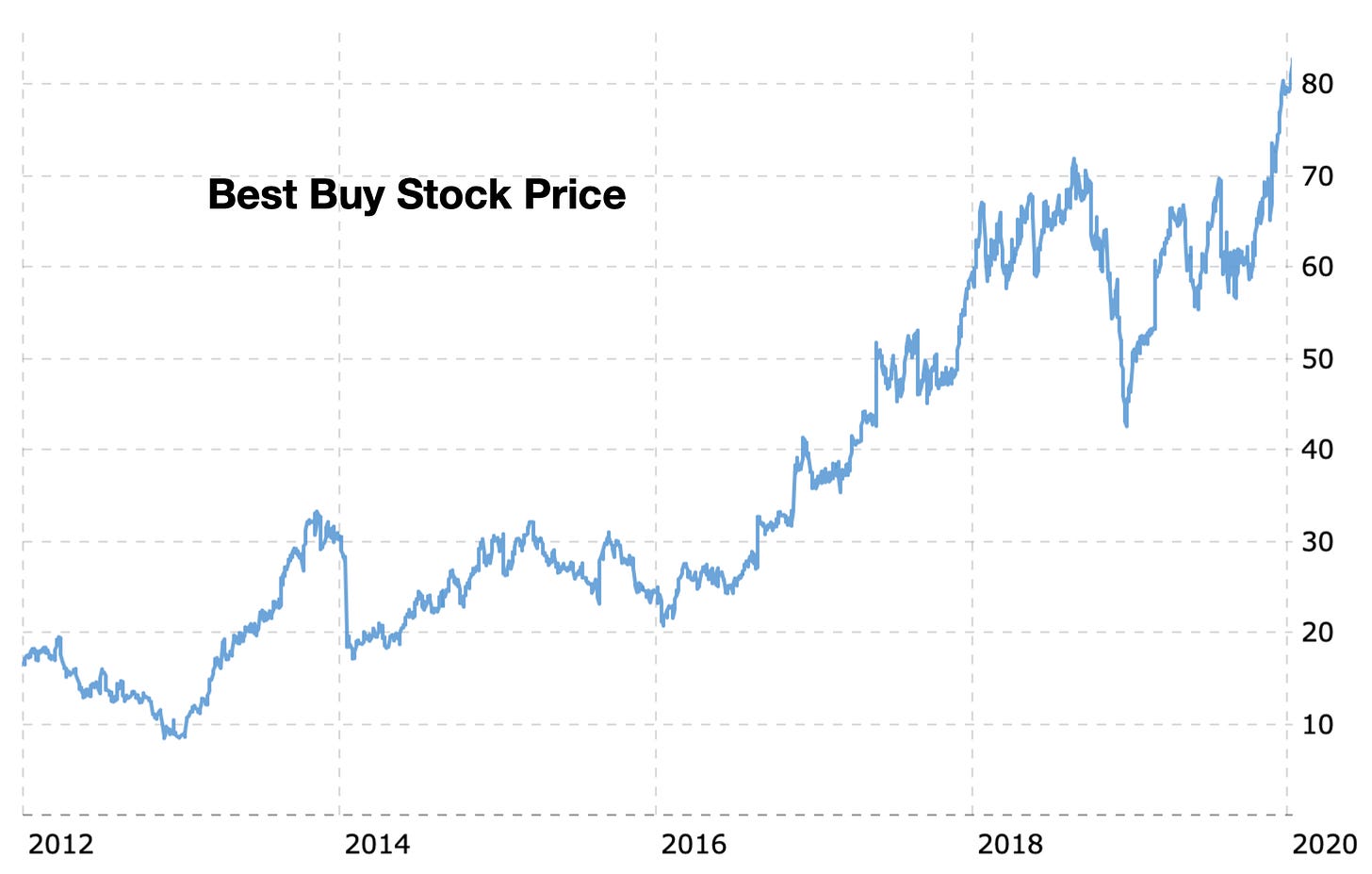Can You Really Find Meaning at Best Buy?
I've attended an annual Harvard Business School executive leadership program for the past eight years. I might be the only psychoanalyst in attendance, but I love this event—not only because I'm a lifelong learner but because there's so much psychology in business. Here's one example.
A decade ago, Best Buy was getting crushed by Amazon. Customers would go to the store to see physical products and then go home to order them online. Many people thought the company was a goner.
Well, now Best Buy is back and stronger than ever, succeeding from a turnaround that started in 2012.
Was the turnaround about classic cost-cutting? Too many employees? Inventory or supply chain problems? Not enough focus? No. Not even close. Their battle for survival transcended these traditional ideas about what makes a business work and focused instead on a noble purpose: to enrich lives through technology. Really.
Hubert Joly had been recruited into Best Buy as the new CEO as a turnaround specialist from the travel and hospitality industry. “The key advice I was given was cut, cut, cut.”
Instead, Joly believed that the world still needed a place to see and touch products. The world needed Best Buy, and its people were the answer.
Every successful relationship, whether a family or a company, has a common noble purpose – a calling. And Best Buy bet on purpose as their most potent competitive response to Amazon’s game-changing business model. Joly describes a noble purpose as the north star of any great business. You may think “purpose” is too soft and fuzzy and maybe not relevant, but let’s take a moment to reflect on what he saw, what he did, and what happened.
Rather than cutting employees, he cultivated them. He didn’t fire employees and instead brought a “human-centric approach” to the turnaround.
How We See Our Work Matters
When we go to work, are we part of something bigger, or is it “just a job?”
Joly focused on changing the way the 100,000 employees of Best Buy saw their work. He held workshops for employees at every level of the company and invited them to connect their work to what they found personally meaningful. They shared stories about an inspiring friend, and what gave their lives meaning. The idea of these workshops was to find the human being in each employee and help them connect their work to their higher purpose in life.
How we think about our work changes our experience, increasing (or decreasing) the value we create. In Joly’s book, The Heart of Business: Leadership Principles for the Next Era of Capitalism, he talks about being an “inspiring friend” to Best Buy customers. One of the critical behaviors of being an inspiring friend is to be human. By stepping back and tapping into their purpose in life and having their aspirations seen and embraced by their co-workers, employees found more meaning in their work. This sense of purpose led to better customer relationships and higher customer satisfaction. Joly calls this “human magic.”
Hubert Joly wasn't always focused on the human side of the business. For the first part of his career, he was a hard-driving, bottom-line-focused executive. Midway through his career, Joly looked at his success, with all its material rewards, and felt empty—what we might call a mid-life crisis. And, like most great leaders, he found the opportunity to grow within the crisis. Working with an executive coach, he began to find meaning in his life. And, as he found out, much of our life's purpose can come through our work.
Joly was influenced by the writing of Victor Frankl, a Jewish-Austrian psychiatrist who survived the Holocaust and went on to write Man's Search for Meaning, a book based on his experience in the concentration camps. In the darkest days, Frankl came to realize that finding meaning in our lives is what matters most. Frankl saw life's three main sources of meaning: work, love, and courage through adversity. He found that those who found purpose and meaning did better in surviving the concentration camps. He wrote, "those who have a 'why' to live can bear with almost any 'how.'" Connecting our work back to what matters most to us makes a difference.
How did Joly’s “human magic” approach work for the employees, the customers, and the shareholders? The stock price increased 800% during Joly’s tenure.
Questions to Consider
How do you see and experience your work? Is it a means to an end, or is it a calling - a primary source of meaning in your life?
Here are some questions I’ve been asking myself after seeing Hubert Joly speak:
Who has been your “inspiring friend” in your life, and what did they teach you?
What would it look like to see your work as a source of meaning in your life?
What keeps you from seeing your work as a calling?
How could you experience more meaning in your work?
What habits or practices would link your day-to-day work with the impact you want to make?
The postscript of Man’s Search for Meaning ends with a beautiful story about Victor Frankl writing down his personal meaning in life and putting it in an envelope. He then asked his students to guess what he’d written as his meaning in life. The room grew quiet, and after a few minutes, a student surprised Frankl and said,
“The meaning of your life is to help others find the meaning of theirs.”
"That was it, exactly," Frankl said. "Those are the very words I had written."



Well said: "Connecting our work back to what matters most to us makes a difference."
Great article. As Peter Drucker said, "culture eats strategy for breakfast". Joly's story is the case study for this important idea.